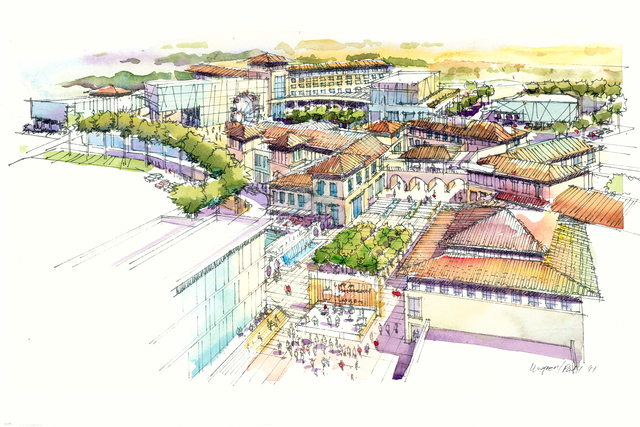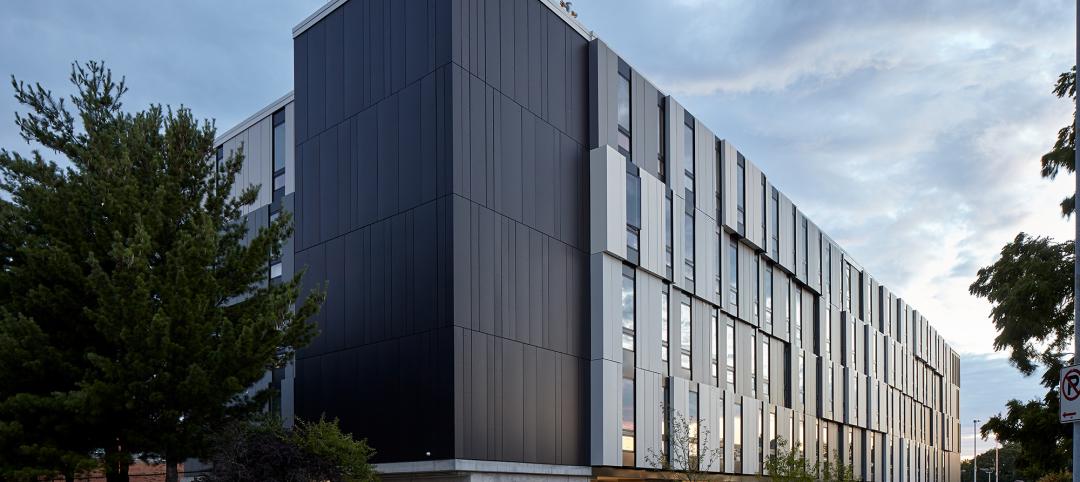Touted as the world’s largest healthcare project, the 170-unit, $1.2 billion Union Village finally broke ground on October 8 in this Las Vegas suburb.
The village, which has been in the works since 2010, is set to start construction early next year, with the first building being an acute-care hospital on 38 acres, according to the Las Vegas Journal-Review. The Valley Health System purchased this land for this facility, which will be its sixth hospital in the state.
The complex is slated to include a 315-bed hospital, and 200-bed nursing facility with long-term acute care, Alzheimer’s care, and assisted living, Healthcare Finance News reports. The hospital and medical center are scheduled to open in late 2016, according to the Journal-Review.
The goal of this village, according to its website, is to create a live-work-play environment that integrates world-class healthcare with retail, entertainment, cultural and residential centers. Nevada Gov. Brian Sandoval, who attended the groundbreaking, calls the village “a Gateway between the city of Henderson and all of Nevada.” And its medical facilities will provide all levels of healthcare whatever the age of the patient.
In April 2011, the city of Henderson approved an agreement to sell a 151 acres of city-owned property for this project for $11.6 million, according to the Las Vegas Sun’s website. At the time it quoted David Mathis, president and CEO of the Nevada Health Care Alliance, who said Union Village would provide a much-needed boost to medical infrastructure in Southern Nevada.
Craig Johnson, a senior living veteran of 20 years and the founder of Union Village, said the village would consist of four parts: the medical facilities in Union Centre; retail, offices, and residential apartments in Union Plaza; a senior community in Union Place; and a civic and cultural center in Union Park.
The buildout is expected to take a decade, reports Healthcare Finance News. The project will create 5,000 construction jobs and 12,000 healthcare and retail jobs, as well as contribute $5 billion to local and state coffers through income and property taxes over its anticipated 80-year lifespan.
Housing for 1,000 seniors will be built, along with at least 350 market-rate condominiums, Johnson told the Journal-Review. The village complex is also expected to include a movie theater, health club and hotel.
The Building Team includes: Hammes Company, Haskell, HKS, Juliet Cos., and Penta Building Group.
Related Stories
Curtain Wall | Aug 15, 2024
7 steps to investigating curtain wall leaks
It is common for significant curtain wall leakage to involve multiple variables. Therefore, a comprehensive multi-faceted investigation is required to determine the origin of leakage, according to building enclosure consultants Richard Aeck and John A. Rudisill with Rimkus.
MFPRO+ News | Aug 14, 2024
Report outlines how Atlanta can collaborate with private sector to spur more housing construction
A report by an Urban Land Institute’s Advisory Services panel, commissioned by the city’s housing authority, Atlanta Housing (AH), offered ways the city could collaborate with developers to spur more housing construction.
Adaptive Reuse | Aug 14, 2024
KPF unveils design for repositioning of Norman Foster’s 8 Canada Square tower in London
8 Canada Square, a Norman Foster-designed office building that’s currently the global headquarters of HSBC Holdings, will have large sections of its façade removed to create landscaped terraces. The project, designed by KPF, will be the world’s largest transformation of an office tower into a sustainable mixed-use building.
Sustainability | Aug 14, 2024
World’s first TRUE Zero Waste for Construction-certified public project delivered in Calif.
The Contra Costa County Administration Building in Martinez, Calif., is the world’s first public project to achieve the zero-waste-focused TRUE Gold certification for construction. The TRUE Certification for Construction program, administered by Green Business Certification Inc. (GBCI), recognizes projects that achieve exceptional levels of waste reduction, reuse, and recycling.
Modular Building | Aug 13, 2024
Strategies for attainable housing design with modular construction
Urban, market-rate housing that lower-income workers can actually afford is one of our country’s biggest needs. For multifamily designers, this challenge presents several opportunities for creating housing that workers can afford on their salaries.
University Buildings | Aug 12, 2024
Planning for growing computer science programs
Driven by emerging AI developments and digital transformation in the business world, university computer science programs are projected to grow by nearly 15% by 2030.
Energy Efficiency | Aug 9, 2024
Artificial intelligence could help reduce energy consumption by as much as 40% by 2050
Artificial intelligence could help U.S. buildings to significantly reduce energy consumption and carbon emissions, according to a paper by researchers at the Lawrence Berkeley National Laboratory.
Sponsored | Healthcare Facilities | Aug 8, 2024
U.S. healthcare building sector trends and innovations for 2024-2025
As new medicines, treatment regimens, and clinical protocols radically alter the medical world, facilities and building environments in which they take form are similarly evolving rapidly. Innovations and trends related to products, materials, assemblies, and building systems for the U.S. healthcare building sector have opened new avenues for better care delivery. Discussions with leading healthcare architecture, engineering, and construction (AEC) firms and owners-operators offer insights into some of the most promising directions. This course is worth 1.0 AIA/HSW learning unit.
Office Buildings | Aug 8, 2024
6 design trends for the legal workplace
Law firms differ from many professional organizations in their need for private offices to meet confidentiality with clients and write and review legal documents in quiet, focused environments
Data Centers | Aug 8, 2024
Global edge data center market to cross $300 billion by 2026, says JLL
Technological megatrends, including IoT and generative AI, will require computing power to be closer to data generation and consumption, fueling growth of edge IT infrastructure, according to a new JLL report.


















